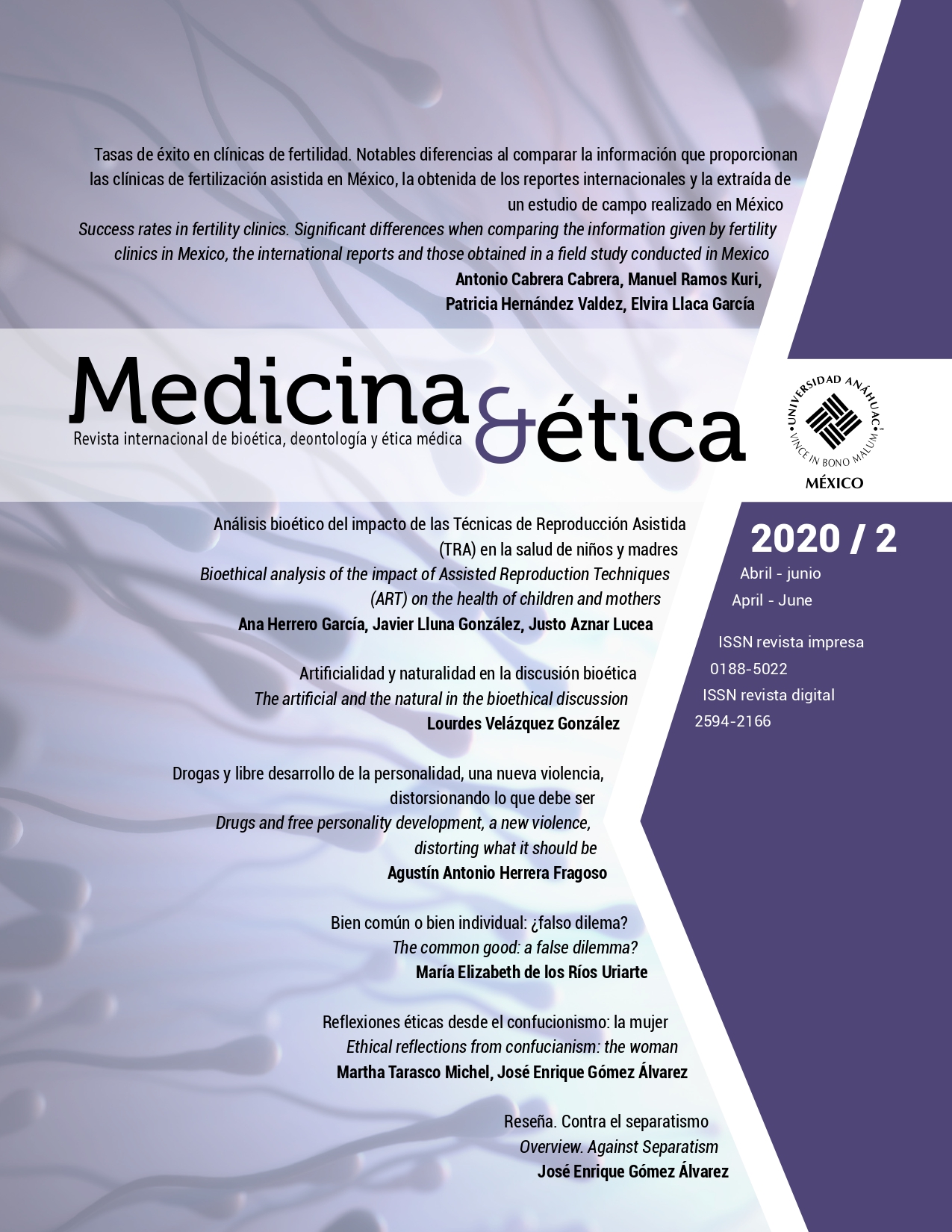The artificial and the natural in the bioethical discussion
Main Article Content
Abstract
The problem of the correct way of using the artificial has been presented several times in bioethics debates and has often had to face a principle that has always been considered fundamental in ethics and adopted as a criterion to assess the moral rectitude of actions. human, that is, the fact of being in conformity with nature. According to this approach, the artificial is potentially bad, while the natural is always good. The tension between these two poles is found, for example, in the debates about medically assisted procreation but it also emerges in discussions about environmental ethics, of roboethics, or in debates about transhumanism. The purpose of this article is not limited to trying to mitigate the conflict between the natural and the artificial, but it is intended to affirm that the artificial is a legitimate part of the natural as it is a specific expression of human nature. As an example of the application of this thesis, the issue of medically assisted procreation is discussed, demonstrating that the elimination of the objection of artificiality does not solve other bioethical problems in this field, but it does analyze them more clearly. Aspects such as «supernumerary embryos» or those related to the legitimacy of using them in a «heterologous» context, are certainly not insignificant and very often have come to attract the attention of academics; however, they refer rather to the «conditions» or «consequences» of the use of medically assisted reproduction techniques and such ethical dilemmas seem to occupy a subordinate position with respect to the «preliminary» problem that we propose to analyze. It is clear that, if the artificial would intrinsically damage the moral legitimacy of the aforementioned practices, it would not be enough to redeem them considering their conditions or consequences.
Downloads
PLUMX Metrics
Article Details

This work is licensed under a Creative Commons Attribution-NonCommercial-ShareAlike 4.0 International License.
Medicina y Ética is distributed under a Creative Commons License Atribución-NoComercial-CompartirIgual 4.0 Internacional.
The author keeps the property rights with no restriction whatsoever and guarantees the magazine the right to be the first publication of the work. The author is free to deposit the published version in any other medium, such as an institutional archive or on his own website.
References
GRECO E. Genitori in provetta. Le certezze, i confini e i limiti normativi della fecondazione in vitro in Italia e nel mondo. Roma: Gremese; 2003.
(2) AGAZZI E. L’être humain et la nature dans le discours éthique. Le discours bioéthique. 2004, p. 113.
(3) ROLLIN F. Liberté responsable. Echanges. 1993; 178.
(4) KANT I. Crítica de la razón pura, trad. P. Ribas. Madrid: Taurus; 2014.
(5) SOWLE C, L.-HAKER H. (eds). Human Nature and Natural Law. Fascículo monográfico de Concilium. 2010; 3: 144.
(6) BOMPIANI A. Le tecniche di fecondazione assistita: una rassegna critica. Milano: Edizioni Vita e Pensiero; 2006.
CASONATO C, FROSINI T. La fecondazione assistita nel diritto comparato. Torino: Giappichelli; 2006.
(7) MORELAND J.P, SCOTT B. Body and Soul. Human Nature and the Crisis of Ethics, Madison WI: Inter Varsity Press; 2000.
MORRESI A. Le forzature sulla procreazione assistita. Se la creatività giuridica cerca di aggirare la legge. Avvenire. 2009.
(8) SCHOPENHAUER A. Metafísica del amor sexual. Buenos Aires: Goncourt; 1977.
(9) PALAZZANI L. La legge italiana sulla procreazione assistita: aspetti filosoficogiuridici. Medicina e Morale. 1999; 28(2/3): 746-760.
(10) AINIS M. I referendum sulla fecondazione assistita. Milano: Giuffrè; 2005.
BALDINI G, SOLDANO M. Tecnologie riproduttive e tutela della persona. Verso un comune diritto europeo per la bioética. Firenze: University Press; 2007. https://doi.org/10.36253/978-88-8453-623-5
(11) RATZINGER J. El don de la vida. México: Palabra; 1992.
(12) SGRECCIA E. Manual de Bioética, Vol. I, Fundamentos y ética biomédica. Madrid: Biblioteca de Autores Cristianos; 2018. ZATTI P. Verso un diritto per la bioética. En MAZZONI, C.M (a cargo de) Una norma giuridica per la bioética. Bologna: Il Mulino; 1998.

